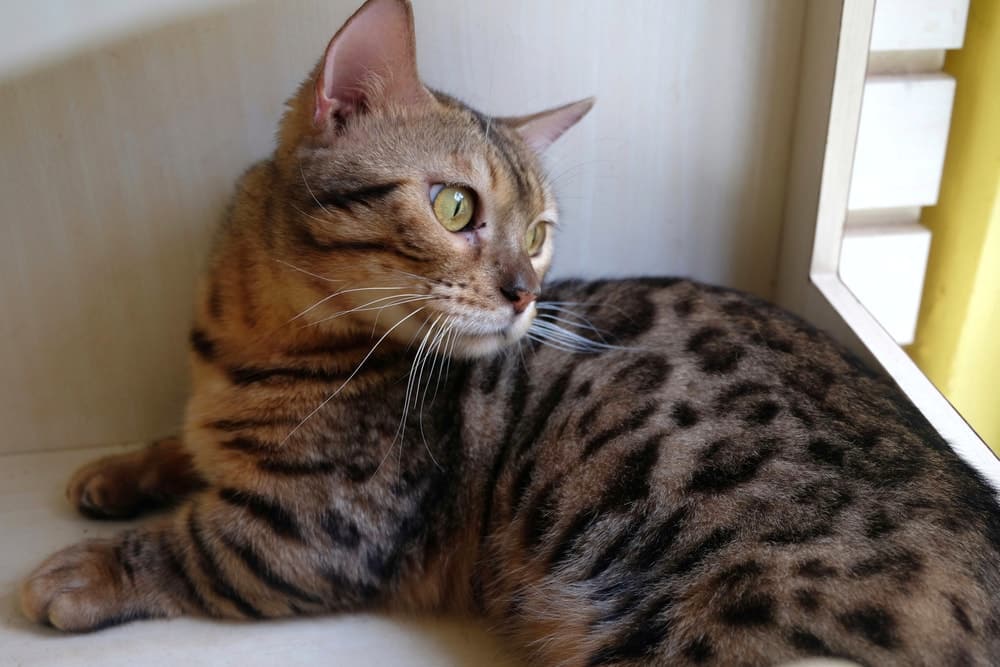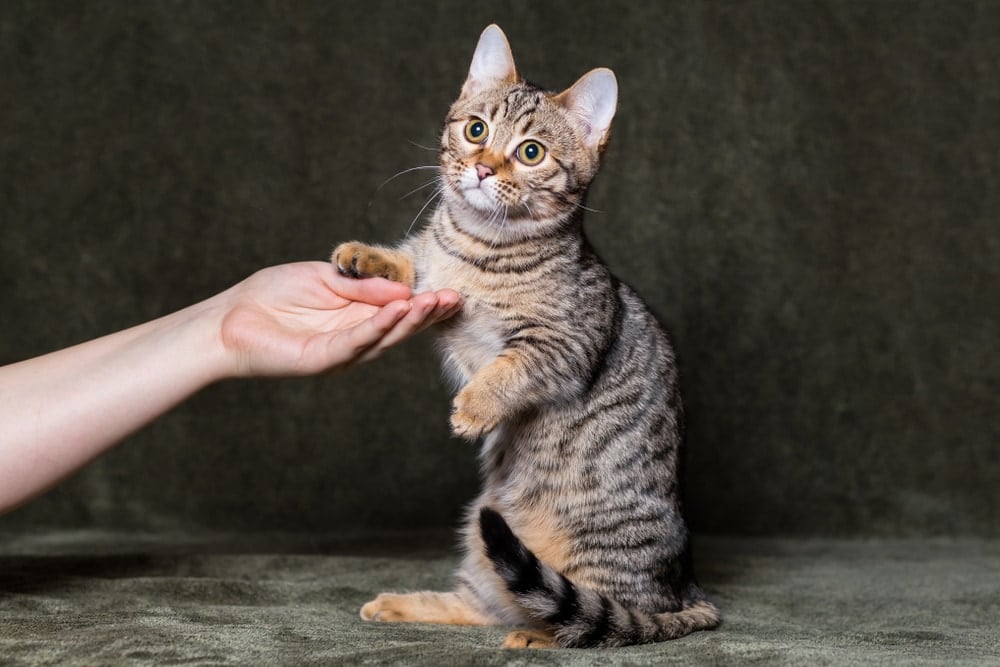Click to Skip Ahead
Breed Overview
Height:
Varies
Weight:
12 to 20 lbs
Lifespan:
15–20 years
Colors:
Brown, black, silver, marble
Patterns:
Spotted or rosette
Suitable for:
Families with kids and other pets, people with allergies
Temperament:
Affectionate, playful, energetic
Do you love the exotic look of a Bengal cat but don’t want to deal with the high price tag? Then you may want to consider getting a Munchkin Bengal Cat Mix. This hybrid cat is becoming more and more popular as people learn about their great temperament and adorable features.
The Munchkin Bengal Cat Mix is a relatively new breed, so there is not much information available on their average height. However, they are typically shorter than purebred Bengals. This is due to the fact that they inherit the short legs of the Munchkin cat. While they may not be as tall as a purebred Bengal, they are still a sizable cats, weighing anywhere from 12 to 20 pounds. They are typically shorter than purebred Bengals. This is due to the fact that they inherit the short legs of the Munchkin cat. While they may not be as tall as a pure
There is also not much information available on their average lifespan. It is theorized that they have the same lifespan as a Bengal house cat, which is 15 to 20 years. The Munchkin Bengal Cat Mix can come in brown, black, silver, and marble. In this article, we will discuss the temperament of the Munchkin Bengal Cat Mix, as well as provide pictures and traits of this unique breed.
Munchkin Bengal Characteristics
Munchkin Bengal Kittens

The Munchkin Bengal Cat Mix is a relatively new breed. They were created by crossing a Munchkin cat with a Bengal cat. This breed was created in order to create a cat with the short legs of the Munchkin but with the size and build of the Bengal. The first litter of Munchkin Bengals was born in 2006, and since then, they have become a popular choice for families looking for a unique and affectionate pet.
The Munchkin Bengal Cat Mix is a high-energy cat that loves to play. They are very affectionate and will often follow their owner around the house. The Munchkin Bengal Cat Mix is also very easy to train. They are a generally healthy breed. However, as with all breeds, they are susceptible to certain health conditions. The Munchkin Bengal Cat Mix has a lifespan of 15 to 20 years. They are also a sociable breed. They love being around people and other animals.
How to Find Reputable Munchkin Bengal Breeders?
If you are looking for a reputable Munchkin Bengal Breeder, it is important to do your research. This includes looking for reviews, visiting the breeder in person, and asking for references. A good breeder will be more than happy to provide you with this information.
The 3 Little-Known Facts About Munchkin Bengals
The Munchkin Bengal Cat Mix is a relatively new breed, so there is not much information available on them. However, here are three little-known facts about this unique cat:
1. Munchkin Bengals might be quite energetic.
One of the parent breeds of this cross, the Bengal, could result in your Munchkin Bengal being quite active. Bengals are known for their high energy levels, so you might see that in your crossbreed.
2. The Munchkin parent breed has some controversy.
Due to their short legs, some people feel that promoting the Munchkin breed is unethical because it popularizes a deformity.
3. They are a great choice for families with kids and other pets.
Both parent breeds are intelligent, making them a good choice for people who want to engage them in activities and games. Things like this will help with any cat’s overall physical and mental health.

Temperament & Intelligence of the Munchkin Bengal Cat Mix
Munchkin Bengals make great indoor cats. They are very affectionate and love being around people, especially when they are being petted and held. Munchkin Bengals also love to cuddle. The Munchkin Bengal Cat Mix is a great choice for families with kids and other pets to keep them company during the daytime, especially since they do not like to be left alone.
Munchkin Bengals love to scratch furniture. It is important to provide them with a scratching post or cat tree to help satisfy this natural instinct. They are not necessarily destructive. However, they can be mischievous at times. It is important to provide them with plenty of toys and activities to keep them occupied. They are very sociable and energetic cats, so providing them with toys and exercise can help them stay entertained and keep them from getting into trouble.

Are These Cas Good for Families?
YES! The Munchkin Bengal Cat Mix is a great choice for families with kids and other pets. They are also suitable for people with allergies, as they are not known to trigger any reactions.
Does This Breed Get Along with Other Pets?
The Munchkin Bengal Cat Mix is a sociable breed. They love being around people and other animals. So, if you are looking for a cat that will get along with your other pets, this is the perfect breed for you!
Are Munchkin Bengals Vocal?
Munchkin Bengals are not known to be particularly vocal. However, as with all cats, they may meow from time to time to get your attention.
Things to Know When Owning a Munchkin Bengal Cat
Food & Diet Requirements 
The Munchkin Bengal Cat Mix is a high-energy cat that loves to play. They are very affectionate and will often follow their owner around the house.
Because of their high energy level, it is important to feed them a diet that is high in protein and fat. This will help them maintain their energy levels and prevent them from becoming overweight. It is also important to make sure that they have access to plenty of fresh water.
Exercise Needs
The Munchkin Bengal Cat Mix loves to play and run around. They should have plenty of space to roam and explore. It is also important to provide them with toys and activities that will keep them mentally stimulated.

Do Munchkin Bengal Cats Like to Be Outside?
Munchkin Bengals are indoor cats. They love being around people and do not like to be outside. The Humane Society recommends keeping cats indoors to protect them from cars, other animals, and diseases.
Do Munchkin Bengals Like to Climb?
Yes, Munchkin Bengals love to climb. They are very agile cats and love to explore their surroundings.
Grooming ✂️
The Munchkin Bengal Cat Mix does not require a lot of grooming. They tend to have shorter hair. However, they should be brushed regularly to remove any dead hair and keep their coat healthy. They should also be bathed as needed.
Training
The Munchkin Bengal Cat Mix is an easy-to-train breed. They are intelligent and quick to learn. However, they can also be stubborn at times. It is important to be consistent with training and rewards to achieve the best results. They should be fairly easy to litter train as well, especially if you raise them from kittenhood and teach them to use the litter box right from the start.

Health and Conditions
The Munchkin Bengal Cat Mix is a generally healthy breed, and since they are still a newer breed, not much is known about specific health conditions that affect them. However, as with all breeds, they are susceptible to certain health conditions.
Some of the most common health issues that affect Munchkin Bengals include:
- Cataracts – a condition that causes the lenses of the eyes to become cloudy
- Entropion – a condition that causes the eyelids to roll inward
- Gingivitis – a condition that causes inflammation of the gums
- While these conditions are not fatal, they can be painful and cause discomfort. So, it’s important to be aware of them when you own a Munchkin Bengal Cat.
- Cardiomyopathy – a heart condition that can be fatal
- Hip Dysplasia – a condition that can cause lameness or pain in the hips
- Patellar Luxation – a condition that causes the kneecap to slip out of place
- While these health problems are serious, they are also relatively rare. So, you shouldn’t let them deter you from getting a Munchkin Bengal Cat Mix.
Caring for a Munchkin Bengal Cat
The best way to care for a Munchkin Bengal Cat is to provide them with plenty of love and attention. They are very affectionate cats and love being around people. It is also important to provide them with plenty of space to roam and explore. In addition, they need toys and activities that will keep them mentally stimulated.
The bottom line is that the Munchkin Bengal Cat is a great pet for those who are looking for an affectionate and playful companion. They are relatively easy to care for and make great family pets. So, if you’re thinking about getting a Munchkin Bengal Cat, go for it! You won’t be disappointed.
Male vs Female
There is no significant difference between male and female Munchkin Bengals. However, some people believe that males are more affectionate than females. In either case, spaying or neutering your Munchkin Bengal can help prevent certain unwanted behaviors and pregnancies.
Conclusion
The Munchkin Bengal Cat Mix is a great choice for families with kids and other pets. They are also suitable for people with allergies, as they are not known to trigger any reactions. The Munchkin Bengal Cat Mix is a generally healthy breed, and there is no significant difference between male and female Munchkin Bengals. Overall, the Munchkin Bengal Cat Mix is a beautiful and unique breed that makes a great addition to any family. If you are looking for an exotic-looking cat with a great personality, then this may be the perfect breed for you.
Featured Image Credit: Sviatoslav_Shevchenko, Shutterstock














